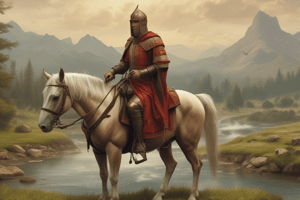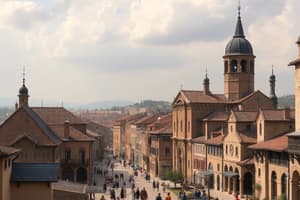Podcast
Questions and Answers
What was the main impact of the Black Death on Europe?
What was the main impact of the Black Death on Europe?
- It led to an increase in agricultural production
- It led to the start of the Hundred Years' War
- It caused widespread death and social and economic disruption (correct)
- It resulted in the formation of guilds
What was the purpose of a letter of credit?
What was the purpose of a letter of credit?
- To facilitate trade between merchants (correct)
- To record the number of battles between France and England
- To document the effects of the Hundred Years' War
- To establish the rules of guilds
What were guilds in medieval society?
What were guilds in medieval society?
- Groups of merchants who started fairs
- Religious groups that opposed usury
- Organizations of craftsmen and merchants to regulate their trades (correct)
- Armies that fought in the Hundred Years' War
What was the commercial revolution?
What was the commercial revolution?
Why did merchants start to make fairs?
Why did merchants start to make fairs?
What is the primary function of a letter of credit?
What is the primary function of a letter of credit?
What was a major consequence of the 'Hundred Years' War and Plague' in Europe?
What was a major consequence of the 'Hundred Years' War and Plague' in Europe?
How did the 'Black Death' affect Europe's population?
How did the 'Black Death' affect Europe's population?
Why was usury considered a sin by Christians?
Why was usury considered a sin by Christians?
What was the social and economic impact of the 'Black Death' on Europe?
What was the social and economic impact of the 'Black Death' on Europe?
Flashcards are hidden until you start studying
Study Notes
Medieval Agriculture
- The Medieval period saw significant changes in agriculture, including the introduction of the heavy plow, which allowed for deeper plowing and cultivation of heavier soils.
- The three-field system was introduced, where one field was planted with crops, one was left fallow, and one was used for grazing livestock, increasing crop yields and reducing soil exhaustion.
- The use of horse collars and horse shoes improved the efficiency of horse-powered plowing.
Guilds
- Guilds were organizations of skilled craftsmen that regulated the practice of their craft, set standards, and protected the interests of their members.
- Guilds also provided training, social services, and welfare to their members.
Members of Guilds
- Masters: experienced craftsmen who owned their own businesses and trained apprentices.
- Journeymen: skilled workers who had completed their apprenticeships and worked for masters.
- Apprentices: young people learning a trade by working under the guidance of a master.
Wars Between France and England
- The Hundred Years' War was a series of conflicts between France and England that lasted from 1337 to 1453, with multiple battles and periods of relative peace.
The Commercial Revolution
- The Commercial Revolution was a period of significant economic change in Europe, marked by the growth of trade, commerce, and banking, particularly in the 12th to 15th centuries.
Fairs and Merchants
- Merchants began to organize fairs, which were temporary markets that brought together buyers and sellers from different regions, promoting trade and economic growth.
The Letter of Credit
- The letter of credit was a financial instrument that allowed merchants to obtain credit and financing for their trade activities, reducing the risk of long-distance trade.
Causes of the Hundred Years' War and the Plague
- The Hundred Years' War was sparked by a succession crisis in the kingdom of France, while the Black Death, a pandemic that devastated Europe, was caused by the bubonic plague.
Impact of the Black Death on Europe
- The Black Death had a profound impact on European society, leading to significant social, economic, and cultural changes, including a shift from a feudal to a more modern economy.
Usury and Christianity
- In Christianity, usury, or lending money at interest, was considered a sin, as it was seen as exploiting the poor and contradicting Christian teachings on charity and generosity.
Letter of Credit
- A letter of credit is a financial instrument used to guarantee payment between a buyer and a seller in international trade.
- It was created to reduce the risk of non-payment and facilitate trade by providing a secure form of payment.
Hundred Years' War and Plague
- The Hundred Years' War was a series of conflicts between England and France that lasted from 1337 to 1453.
- Causes of the war include:
- Succession crisis in the Kingdom of France
- English claims to the French throne
- Economic interests, such as control of the wool trade
- Political and territorial disputes
- The Black Death, also known as the Plague, was a pandemic that ravaged Europe from 1347 to 1351, killing an estimated 75 to 200 million people.
Impact of the Black Death on Europe
- The Black Death had a significant impact on European society, economy, and culture, leading to:
- Changes in the feudal system and social hierarchy
- Labor shortages and increased social mobility
- Economic instability and inflation
- Shifts in cultural and artistic expression
- Increased anti-Semitic violence and persecution
Usury in Christianity
- Usury, or the practice of lending money at excessive interest rates, was considered a sinful activity in Christianity.
- The concept of usury was based on biblical teachings, such as the prohibition on charging interest to fellow Israelites in the Old Testament.
- The Catholic Church prohibited usury in the Middle Ages, andViolation of this prohibition was considered a moral and ethical offense.
Studying That Suits You
Use AI to generate personalized quizzes and flashcards to suit your learning preferences.




